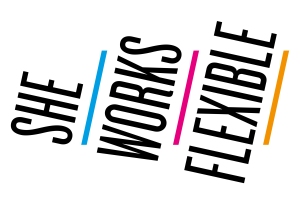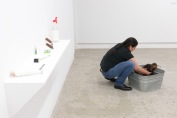Nadège Grebmeier Forget, Ursula Johnson, Autumn Knight,
Michelle Lacombe, and Mikhel Proulx
Wednesday March 30 – Saturday April 24, 2016
She Works Flexible: Flex Space 2608 Dunlavy St, Houston, TX 77006
Opening Reception: Saturday April 2nd, 7-9pm
I’ve Only Known My Own is a group exhibition of new performance works that explore how the materiality of the body is translated or communicated through measurements, process, technology, and documentation. This exhibition looks at how the matter of the body might become a tool or force that generates or expresses its own (il/logical) systems, and thinks through how this material embodiment might function as a form of resistance. Rather than presenting a fixed set of works, the exhibition will evolve over the course of its three-week run, with objects, props, and works being set in motion during the presentation of each of the 4 performances. Inhabiting the quasi-domestic architecture of the gallery, the artists will work within the rooms of She Works Flexible’s Flex Space, gradually interacting with the space and leaving traces behind.
Nadège Grebmeier Forget‘s (Montreal, QC) ongoing series One on one’s for so-called fans involves private performances that are then translated through oral accounts and performative re-tellings, highlighting the role of documentation and technology in mediating access to her performing body. Ursula Johnson (Dartmouth, NS) will present a new work that continues her investigations into the ways that indigenous cultural practices such as basket-weaving or leather tanning are now transmitted from body to body, and place to place. Autumn Knight‘s (Houston, TX) new performance Documents will compile a reading of the documentation that serves to legitimize (American) citizenship, while holding space for the embodied specificities of race, class, and gender to contest whether these documents accurately reflect the bodies they are meant to represent. Michelle Lacombe (Montreal, QC) will present excerpts from her project Of All the Watery Bodies, I Only Know My Own, where she used a monthly measurement of the volume of blood in her body to determine the placement of a tattooed water line around her calves. Mikhel Proulx (Montreal, QC), a scholar who has written about the ways in which queer bodies are (re)presented in online spaces and through self-imaging practices such as web-camming and selfies, will be on site to research a text that will be published following the close of the exhibition.
SCHEDULE OF PERFORMANCES
Ursula Johnson – Saturday April 2nd, starting at 2pm
Michelle Lacombe – Thursday April 7, sunset (approx. 7:45pm) – 9pm
Autumn Knight – Friday April 8th, 8pm-9pm
Nadège Grebmeier Forget – Saturday April 9th, 3:30pm
I’ve Only Known My Own was presented by the Core Residency Program, Glassell School of Art in partnership with Dan Fergus, Brasil Café, and She Works Flexible. Nadège Grebmeier Forget’s project has also received support through Diagonale’s La Soupée event, and Michelle Lacombe would like to thank Centre Sagamie for supporting the production of her images. Sincere thanks to all those who have offered advice and support along the way: Anthea Black, Andy Campbell, Rachel Cook, Joshua Cordova, Lily Cox-Richard, Danielle Dean, Dean Daderko, Taraneh Fazeli, Peter Gershon, Joe Havel, Collin Hedrick, Kerry Inman, Mary Leclère, Val Mayes, Lynne McCabe, Michael Murland, and Olya Zarapina.





 This publication gathers together traces from the first iteration of this exhibition, which took place in Houston in the spring of 2016. It is intended to offer a bridge between that exhibition, and the one at Optica in the spring of 2017.
This publication gathers together traces from the first iteration of this exhibition, which took place in Houston in the spring of 2016. It is intended to offer a bridge between that exhibition, and the one at Optica in the spring of 2017.



























